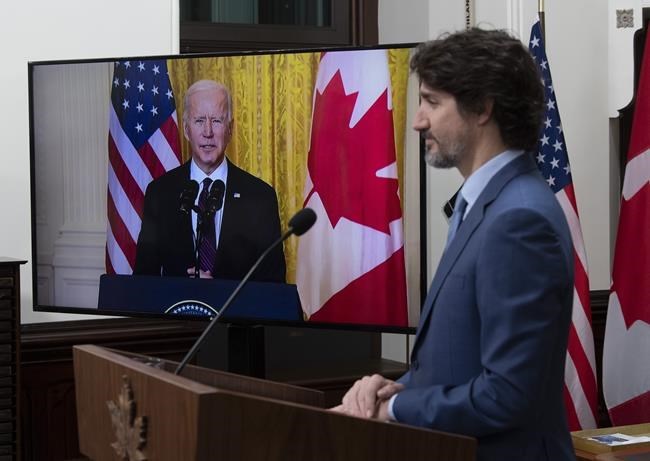WASHINGTON — Last year's confluence of COVID-19 and Donald Trump exposed the urgent need to reinvent North America, experts across the continent agreed Tuesday as they explored how best to fortify its trilateral ties.
The Washington-based Wilson Center convened a virtual gathering of 13 different academics, ambassadors and diplomats from all three countries to flesh out the idea of renewing the North American relationship.
The prospect has been much discussed in recent days, thanks to a flurry of high-profile political meetings between American leaders and their Canadian or Mexican counterparts aimed at signalling U.S. President Joe Biden's post-Trump commitment to multilateral diplomacy.
But there's a risk that the movement never rises beyond the level of well-crafted political rhetoric, said Alan Bersin, former chief diplomatic officer of the U.S. Department of Homeland Security.
To work, he said, the endeavour will need buy-in at the grassroots level in all three countries, as well as from the business community.
Trump "did create an impetus for business, for the first time, to recognize that they better defend the shared production platform that has arisen in the last 25 years in North America," Bersin said.
"We can do it much better together than we can do it alone."
That will be more easily said than done, he added — noting the fact that each of the three countries has a different name for the U.S.-Mexico-Canada Agreement, which replaced NAFTA last year. Each country puts its own name first.
"We've got to actually start to create an atmosphere and an understanding broadly that it's better for us to face the world together in the next generation than to concentrate on our separate paths."
Perhaps the starkest illustration of the fragility of North American supply chains, even in the age of the USMCA, came last April when Trump ordered Minnesota-based 3M to stop exporting American-made N95 respirators outside the country.
The company itself, which pushed back on humanitarian grounds, eventually defused the crisis by promising to meet demand in the U.S. by importing masks from its overseas facilities.
Trump's protectionist instincts have lingered, however: the Biden administration has so far shown no interest in reversing the former president's insistence that U.S.-made vaccines be reserved for American arms.
Canada needs to take stock now about how to inoculate itself from similar problems before the next pandemic hits, said Michael Grant, assistant deputy minister for the Americas with Global Affairs Canada.
"We need to be prepared for something like this happening again," said Grant, calling for a "Fortress North America" approach that would prioritize supply lines within the continent itself.
"There are some fragilities there that I think we need to work on."
For 20 years, businesses and ordinary citizens alike have embraced the idea of North America as a single, unified region, said Bill Crosbie, formerly director general of the North America Bureau, which oversees Canadian embassies and consulates across the continent.
Only at the political level have relations between the three seen ups and downs, he said.
"The government, top-down side of things, it waxes and wanes, and it has waned over the past few years," Crosbie said.
"But if we can bring back to the table ... the areas where we have joined up, where we've been successful — either as governments or as the private sector or as civil societies — we can build on those successes to demonstrate that this collaboration is delivering real benefits for people in all three countries.
Tuesday's virtual conference kicked off the Wilson Center's "North America 2.0" project aimed at floating policy recommendations for a more unified trilateral relationship.
But it also followed nearly a solid week of earnest bilateral conversations between high-level leaders in all three countries, beginning with Biden's virtual meeting Feb. 23 with Prime Minister Justin Trudeau.
The centrepiece of that meeting — a "Road Map for a Renewed U.S.-Canada Partnership" — detailed a "whole-of-government" effort to co-operate in a number of areas of mutual interest.
Those included beating back COVID-19 and resurrecting the pandemic-battered North American economy, a united front against climate change, addressing income inequality and social injustice on both sides of the border and restoring global faith in multilateral institutions like the World Trade Organization.
This report by The Canadian Press was first published March 2, 2021.
James McCarten, The Canadian Press



